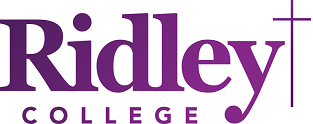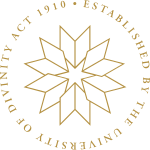
The Uniting Church in Australia (UCA) was founded on 22 June 1977, when most congregations of the Methodist Church of Australasia, about two-thirds of the Presbyterian Church of Australia and almost all the churches of the Congregational Union of Australia united under the Basis of Union. According to the church, it had 243,000 members in 2018. In the 2016 census, 870,183 Australians identified with the church, but that figure fell to 673,260 in the 2021 census. In the 2011 census, that figure was 1,065,796.

The Presbyterian Theological College (PTC) is the theological college of the Presbyterian Church of Victoria. It provides theological education for candidates for the ministry of the Presbyterian Church of Australia, as well as for members of other Christian churches. It is an approved teaching institution of the Australian College of Theology and is based in the Melbourne, Australia suburb of Box Hill.
Adelaide College of Divinity (ACD) was an accredited higher education provider offering diploma, associate and bachelor's degrees, graduate diplomas, master and doctoral degrees in ministry, it also was a Registered Training Organisation offering certificates and a diploma.

The Australian College of Theology (ACT) is an Australian higher education provider based in Sydney, New South Wales. The college delivers awards in ministry and theology. It is now one of two major consortia of theological colleges in Australia, alongside the University of Divinity. Over 23,000 people have graduated since the foundation of the college. On 7 October 2022 it was granted university college status by the Tertiary Education Quality and Standards Agency.

The Uniting College for Leadership and Theology located at Brooklyn Park South Australia is a Uniting Church in Australia (UCA) theological college for the education and training of both lay people and those for specified ministries including the diaconate and youth workers. It is a member college of the University of Divinity.

Trinity College Theological School (TCTS) is an educational division of Australia's Trinity College, the oldest residential college of the University of Melbourne. It is also one of the constituent colleges of the University of Divinity. The School provides theological education and shapes men and women for ordained and lay ministry in the Anglican tradition, as well as providing other programs of study, including higher degrees by research.

Ridley College, briefly also known as Ridley Melbourne, is a Christian theological college in the parklands of central Melbourne in the Australian state of Victoria. Established in 1910, it has an evangelical foundation and outlook and is affiliated with the Australian College of Theology and the Anglican Church of Australia. The college offers on-campus and online learning and provides training for various Christian ministries in a range of contexts.
The United Faculty of Theology (UFT) was a recognised teaching institution of the University of Divinity in Melbourne, Australia. It was founded in 1969 as an informal association of theological colleges and ceased operating in December 2014.
George Merrick Long was an Anglican bishop and educationist who served as a brigadier general in the Australian Imperial Force during the First World War. He was also involved in the establishment of Trinity Grammar School in Melbourne, where he became headmaster. He was father of the historian Gavin Long.
Whitley College is a Baptist theological institute in Melbourne, Victoria, Australia. The college is associated with the Baptist Union of Victoria and is one of the theological schools of the University of Divinity.

The Anglican Diocese of Melbourne is the metropolitan diocese of the Province of Victoria in the Anglican Church of Australia. The diocese was founded from the Diocese of Australia by letters patent of 25 June 1847 and includes the cities of Melbourne and Geelong and also some more rural areas. The cathedral church is St Paul's Cathedral, Melbourne. The current Archbishop of Melbourne since 2006 is Philip Freier, who was translated from the Anglican Diocese of The Northern Territory, and who was the Anglican Primate of Australia from 2014 to 2020.

Royal Parade is a major urban road in Victoria, Australia, linking Melbourne City to Brunswick and the northern suburbs. It is the site of major educational and sporting facilities as well as several buildings of heritage significance.
Dorothy Ann Lee is an Australian theologian and Anglican priest, formerly dean of the Trinity College Theological School, Melbourne, a college of the University of Divinity, and continuing as Frank Woods Distinguished Professor of New Testament. Her main research interests include the narrative and theology of the Gospels, particularly the Gospel of John, spirituality in the New Testament, the Transfiguration and Anglican worship.

St Mark's National Theological Centre is a theological college in Australia. It is owned and operated by the Anglican Diocese of Canberra and Goulburn.

Pilgrim Theological College is an Australian theological college and a member college of the University of Divinity. It is part of the Uniting Church in Australia Synod of Victoria and Tasmania's Centre for Theology & Ministry.
Janette Patricia Gray (1952–2016) was an Australian Sister of Mercy who was the first non-Jesuit academic Principal of Jesuit Theological College, Parkville, Melbourne. A fund established in Gray's honour promotes the education and leadership of women in theology and is called the Janette Gray RSM Fund.
Maryanne P. Confoy RSC is an Australian religious Sister of Charity who has also been a teacher and scholar, working primarily in the areas of ministry and spirituality.
Marita Munro is an Australian minister and academic who was the first Baptist woman to be ordained in Australia.

Catholic Theological College (CTC) is one of the constituent theological colleges of the University of Divinity, an Australian collegiate university of specialisation in divinity. The college is located in East Melbourne, Victoria.

Peter Sherlock is an Australian academic and inaugural Vice-Chancellor of the University of Divinity in Melbourne, a role he has held since 2012. He specialises in the cultural history of Renaissance and Reformation Europe, and is a recognised authority on historic monuments.













